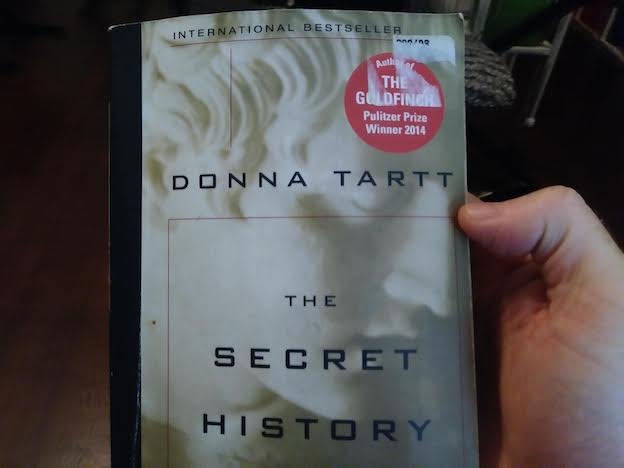I’m currently reading a very chilling, well-written novel called “The Secret History” by Donna Tartt. The premise of the book is this: some college students get involved a strange experiment with a classical Greek bacchanalia (alluded to but not shown in detail) and end up murdering a farmer in the woods. To cover this up, they also plan and execute the murder of a fellow student, an admittedly awful fellow, who has found out about the first murder. In the end, they somehow get away with both murders (I don’t yet completely know how, as I haven’t finished).
Yeah. Pretty gruesome. The book reads like a pure-bred Gothic novel. The novel’s chilling nature is foreshadowed throughout its exposition: for example, the main character catches pneumonia from living in an unheated room for months during a East Coast winter, and the female would-be love interest cuts herself inexplicably while walking on the beach. It doesn’t get out-right macabre until a few hundred pages in, when the death of the farmer is revealed in the hands of the crazed college students’ strange ritual, followed by the murder of the other student, which unfolds sourly and inevitably like a really bad idea whose time you know has come.
Now why on earth, in my blog about happiness, do I bring this book up? Well, first of all, I love a good read, and this is definitely a page-turner. As I said, the book is really well-written. The prose is stellar, and the characters are so life-like, the situation so believable, that I got sucked in from the very beginning. For another, and I think even more importantly for this genre, I, the reader, find myself in the strange predicament of empathizing and in a way routing for these messed up college students murderers.
Like it or not, our protaganist is a murderer! Yet from the very first page, I felt an empathy for this guy. From the beginning he is clearly a confused about life, just wanting to make friends (who turn out to be the ones who commit the first murder). Once you start to get where this is all going, it gets very uncomfortable very fast. You feel blind-sided by the strange and deathly circumstances that the narrator finds himself in. Furthermore, you are as conflicted as he is. The scent of tragedy is in the air, and the sense that this cannot end well.
Our narrator is not actually involved in the first murder, yet when the other students reveal to him what happened, he keeps their secret. Meanwhile, the student that they all (including our narrator) conspire to murder becomes more and more difficult to bear, as he nearly blackmails them, meanwhile being a loud-mouthed, prejudiced, and inconsiderate windbag who threatens to tell their secret (he does have enough of a semblance of humanity to make you conflicted, very conflicted about them murdering him).
Reading this book, I am struck with a mixture of admiration and horror at the complexity of the situation. Strangely enough, it is quite easy to imagine how some immature and maladjusted young adults could find themselves performing some ill-advised experiments in the ideas of antiquity, and how this could go horribly awry and lead to someone’s death. I mean, it could happen. And then what do you do when another student, who is admittedly quite an a-hole, finds out about it and lords that over you? It all unfolds like clockwork, as these tragically-flawed but otherwise somewhat normal characters execute the most horrid conspiracy in the name of their self-preservation.
This book presents an inherent conflict for the reader. How to feel about the events that unfold? It reminds me of “Billy Budd,” a Herman Melville story I read back in high school. Billy Budd is an innocent sailor falsely accused of mutiny by his captain, who is envious of him. During an exchange with the captain, Billy accidentally kills him. Billy is then found guilty and then executed for his crime, despite the fact that he was wrongly accused in the first place by the villainous captain. One feels empathy for the punished Billy Budd, and a conflict about which side is right.
In “The Secret History,” one feels badly conflicted about these college students playing God. On the other hand, the student they murder is written as the type of character you want to be killed off…. ideally, by a tree falling on him accidentally, or after being caught in an embezzling scheme and put in jail… not by the main characters themselves! An accidental death or other form of neat resolution of this character might fit in a rosier novel, but this is no rosy novel.
Yet it’s still a good read.
